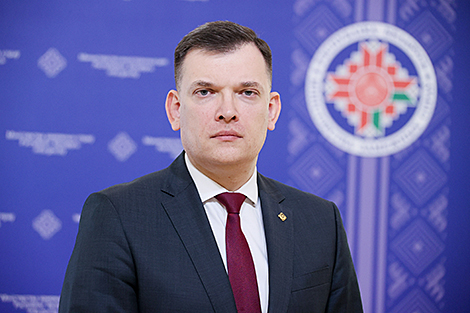Business news
Belarus calls on UN for more efforts to remove obstacles in shipping fertilizers

An archive photo
MINSK, 5 August (BelTA) - Belarus insists on eliminating restrictions on the supply of potash fertilizers and putting this issue on the agenda of international structures that are making efforts to prevent a global food crisis, Belarusian Deputy Minister of Foreign Affairs Yuri Ambrazevich told the media, BelTA has learned.
The question addressed for the deputy minister of foreign affairs was related to the recent comments of UNCTAD Secretary-General Rebeca Grynspan at a press conference in New York on the efforts made by the UN to eliminate obstacles to food and fertilizer supplies from Russia. Specifically, she said that the UN Group has been working hard to remove obstacles to the supply of food and fertilizers from Russia in terms of finance, insurance, shipping and transportation. That raises the question of why the removal of obstacles to the supply of Belarusian potash fertilizers has not been touched upon. Would the international efforts that Grynspan talks about be exhaustive if the world's largest fertilizer producer, Belarus, were to drop out of the chain?
“Belarus would like to welcome real progress in resolving the issue of removing obstacles to access of Russian goods to international markets, including Russian mineral fertilizers,” Yuri Ambrazevich said. “The easier it will be for Russia to ensure its export freedom, the more opportunities it will have for mutually beneficial trade with Belarus, for the purchase of Belarusian goods, for the implementation of other important cooperation projects within the framework of the Union State. As a matter of fact, the same is true with regard to Belarus' export freedom,” he said.
However, there has been insufficient action by both the UN Secretary-General and the UNCTAD Secretary-General to confront the potential threat of food insecurity for the least developed countries and the rising costs for developing countries in ensuring their own food security, Yuri Ambrazevich said. Everyone understands that the UN structures, as well as their Secretariats, are limited by the political will of member countries, the deputy minister added.
“Mr. Guterres [UN Secretary General] has some very firsthand information about the Belarusian potash fertilizers, from the President of the Republic of Belarus. Our diplomats have brought it to the attention of all the UN officials involved. At the same time, it should be noted that the issue of illegal restrictions on the access of Belarusian potash fertilizers to the international market is still carefully avoided by the international structures,” the deputy minister said.
According to Yuri Ambrazevich, Belarus is one of the three global producers of potassium chloride along with Russia and Canada. “Before the sanctions Belarusian potash fertilizers met almost 20% of global demand. The potassium deficit, caused by its under-supply to the world market from Belarus and, of course, from Russia, became a catalyst for a spike in fertilizer prices. No one in the world can effectively replace Belarusian potash in the market overnight. It is a complicated and time-consuming technological and economic task. All the speculations about the allegedly quick increase of sales by some alternative suppliers are nothing more than an attempt to hush the problem,” he said.
In his opinion, everyone in the world should know, and first of all people in developing countries, that if today Belarusian potassium regained unhindered access to the world market, the price of fertilizers would drop significantly, perhaps almost by half. “People in developing countries need to know that their bread, rice or beans are getting more expensive as a result of the sanctions policy of the U.S. and European Union governments,” said Yuri Ambrazevich.
“In this regard, I believe that the efforts of the UN, UNCTAD, in particular their officials, to address the whole range of problems related to global food security should be continued. The issue of Belarusian potassium should be placed on the top of the list of tasks to be solved,” the deputy minister said.







 print version
print version make home page
make home page add to bookmarks
add to bookmarks

